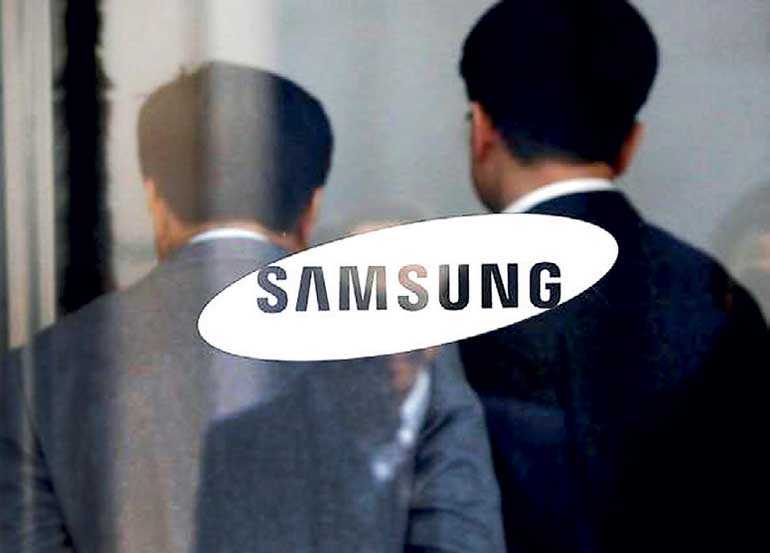Wednesday Feb 18, 2026
Wednesday Feb 18, 2026
Thursday, 9 August 2018 00:00 - - {{hitsCtrl.values.hits}}

SEOUL (Reuters): Samsung Group will invest 25 trillion won ($22 billion) over three years in artificial intelligence, 5G mobile technology, electronic components for autos, and the biopharmaceutical business, Samsung Electronics said on Wednesday.
The investment is part of a broader 180 trillion won package South Korea’s biggest business group is planning to spend over the period to create jobs and secure new growth areas, as its core semiconductor and smartphone businesses weaken.
Samsung Electronics, the world’s top maker of memory chips and smartphones and the group’s flagship company, did not provide a breakdown of the figures but said it will provide most of the investment.
It said the group plans to significantly expand artificial intelligence (AI) research capability, increasing the number of advanced AI researchers to 1,000 across its global AI centres, and heavily invest in biopharmaceuticals.
“Samsung has seen strong growth from both its contract manufacturing and biosimilar businesses. It will continue to invest heavily in the businesses, including developing and manufacturing biosimilars,” it said in a statement.
The announcement sent shares in contract drugmaker Samsung BioLogics up more than 5%. Shares in the group’s information technology services affiliate Samsung SDS rose 5%.
The 180 trillion won three-year investment plan, which includes capital spending as well as research and development in chips and displays, marks a 6% increase from its spending over the past three years.
Of the total, 130 trillion won will be spent in South Korea, and is expected to create 40,000 jobs, or 20,000 more than its previous hiring plans, Samsung said.
The investment plan comes after South Korea’s finance minister met Samsung heir Jay Y.Lee on Monday and called for help in job creation.
Lee was released from jail earlier in 2018 after a year in detention on bribery charges, lifting hopes among some investors that Samsung will hike investments and create jobs.
Samsung Group has 62 affiliates, with a total asset of 399 trillion won, according to the country’s Fair Trade Commission.
LONDON (Reuters): Samsung’s Galaxy S7 smartphones contain a microchip security flaw, uncovered earlier this year, that put tens of millions of devices at risk to hackers looking to spy on their users, researchers told Reuters.
The Galaxy 7 and other smartphones made by Samsung Electronics were previously thought to be immune to a security vulnerability known as Meltdown, which researchers said affected most of the world’s PCs, smartphones and other computing devices.
Researchers from Austria’s Graz Technical University told Reuters they have figured out a way to exploit the Meltdown vulnerability to attack Galaxy S7 handsets.
The team plans to release their findings on Wednesday at the Black Hat security conference in Las Vegas. They are looking into Meltdown’s impact on other makes and models of smartphones and expect to uncover more vulnerable devices in the near future, researcher Michael Schwarz told Reuters.
“There are potentially even more phones affected that we don’t know about yet,” he said. “There are potentially hundreds of millions of phones out there that are affected by Meltdown and may not be patched because the vendors themselves do not know.”
Samsung said it created a patch to protect Galaxy S7 handsets against Meltdown that it began pushing out to affected users last month.
“Samsung takes security very seriously and our products and services are designed with security as a priority,” the company said in a statement.
A Samsung spokeswoman declined to say how many Galaxy S7s were vulnerable to Meltdown attacks.
She said there were no reported cases where Meltdown had been exploited to attack an S7 handset and that no other Samsung phones were known to be vulnerable.
Meltdown, and a second vulnerability known as Spectre, can be exploited to reveal the contents of a computer device’s central processing unit - designed to be a secure inner sanctum. Hackers can exploit those vulnerabilities by either bypassing hardware barriers or tricking applications into giving up secret information such as passwords or banking details.
There are no known cases of hackers exploiting either vulnerability in a real-world attack, but disclosure of the widespread hardware flaws has rocked the computer industry, forcing chipmakers and device manufacturers to scramble to contain the fallout.
The Galaxy S7 is currently used by some 30 million people, according to research firm Strategy Analytics. Samsung has released two new versions of its flagship Galaxy line of smartphones since the S7 debuted in 2016.